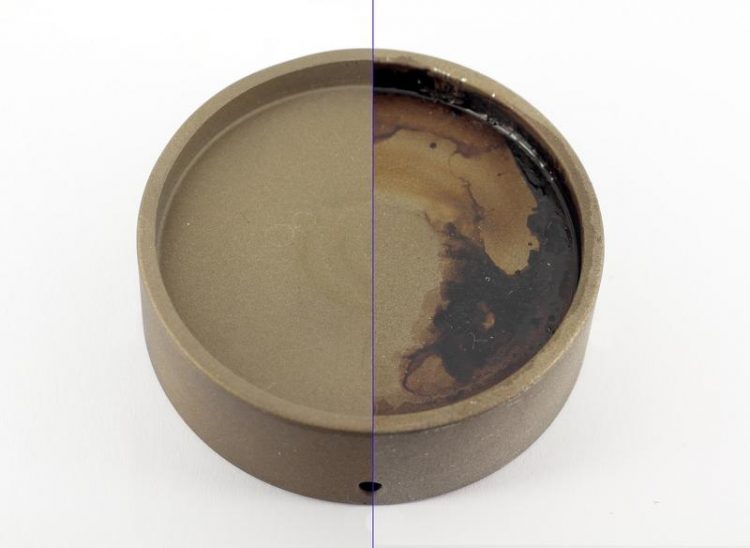Coking of fluid fuels – New procedure shall analyze and avoid reasons

Within the combustion of fluid fuels on hot surfaces, undesirable deposits may occur. Comparing example of a test apparatus with and without deposits. OWI Oel-Waerme-Institut GmbH
Deposits arise during the evaporation of fuels on hot surfaces. The detailed processes are unclear. Within a common research project, the chair for Analytical Chemistry of the University Rostock and the Oel-Waerme-Institut (OWI) want to get to the bottom of the reasons for deposit formation in modern combustion systems.
Aim of the research project is to rebuild and analyze the process of deposit formation in form of a reproducible and under laboratory conditions representable procedure. Suitable seems to be the existing procedure of the thermogravimetric analysis (TGA), which still needs to be enhanced.
Afterwards, the TGA built deposits are transferred into the gas phase by further continuous increase of the surface temperature (pyrolysis) or oxidation and investigated via mass spectroscopic analysis (TGA/MS).
With help of this procedure, the simulation of processes in the building and regeneration of deposits, which can be observed within technical combustion, under defined thermal boundary conditions is possible for the first time. That allows a transmission of knowledge into the technical development of mixture formation systems for heating systems or fuels and additives.
In current research, numerous influencing variables of the deposit formation such as the fuel composition, especially the material and roughness of the wetted surface, are discussed and easily displayed by a suitable selection of the TGA’s sample container.
In a second part of the project, the knowledge shall be used to either avoid the deposit formation or to reduce formed deposits by a suitable process control. For this, two test benches are developed by which the tendency for coking of technical mixture formation systems (porous medium and spray formation) can be examined.
Media Contact
More Information:
http://www.owi-aachen.de/All latest news from the category: Process Engineering
This special field revolves around processes for modifying material properties (milling, cooling), composition (filtration, distillation) and type (oxidation, hydration).
Valuable information is available on a broad range of technologies including material separation, laser processes, measuring techniques and robot engineering in addition to testing methods and coating and materials analysis processes.
Newest articles

First-of-its-kind study uses remote sensing to monitor plastic debris in rivers and lakes
Remote sensing creates a cost-effective solution to monitoring plastic pollution. A first-of-its-kind study from researchers at the University of Minnesota Twin Cities shows how remote sensing can help monitor and…

Laser-based artificial neuron mimics nerve cell functions at lightning speed
With a processing speed a billion times faster than nature, chip-based laser neuron could help advance AI tasks such as pattern recognition and sequence prediction. Researchers have developed a laser-based…

Optimising the processing of plastic waste
Just one look in the yellow bin reveals a colourful jumble of different types of plastic. However, the purer and more uniform plastic waste is, the easier it is to…



